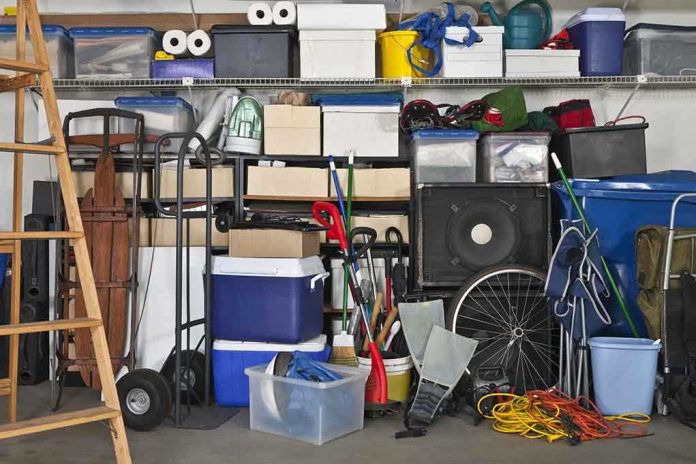
The next time your mind spirals into a stress cyclone, the most underrated way to regain control might not be meditation or deep breathing—but grabbing a trash bag and ruthlessly decluttering your junk drawer, according to psychologists who say your urge to tidy is more powerful than you think.
At a Glance
- Decluttering during stress is a natural, psychologically driven response that can interrupt negative thought cycles.
- Research links cluttered environments to higher stress and impaired focus, while tidying up boosts emotional well-being.
- Experts warn there’s a fine line between healthy decluttering and compulsive behavior tied to OCD.
- The decluttering boom has shaped industries, mental health practices, and even our cultural definition of “control.”
Decluttering: The Secret Weapon Hiding in Your Hall Closet
Picture this: you’re pacing the kitchen, chewing over the same old worries. Suddenly, the urge hits—out come the garbage bags and every expired spice bottle in your pantry is living on borrowed time. This isn’t just procrastination with a side of lemon-scented Pledge. Psychologists trace this compulsion back to self-efficacy, a term coined in the 1970s by psychologist Albert Bandura, describing your belief in your power to shape your circumstances. When life feels chaotic, controlling your physical space becomes a concrete way to push back against the storm.
Environmental psychology, that unsung hero of the mental health world, reinforces this phenomenon. Research out of Princeton University shows that clutter overloads your visual cortex, making it harder to focus and upping your stress. UCLA took it a step further: their studies found that people living in cluttered homes had elevated cortisol levels—the same hormone your body pumps out when it’s running from a saber-toothed tiger, or your in-laws. The evidence is clear: your brain doesn’t just dislike mess, it actively rebels against it.
When a “Tidy Fix” Turns Into an Obsession
Decluttering is on trend, thanks to the gospel of minimalism and high-profile influencers like Marie Kondo, who turned “spark joy” into a global mantra. But some folks take it to extremes. Compulsive decluttering, known in clinical circles as “compulsive spartanism,” is a growing concern among psychologists. This isn’t just enthusiasm for organized sock drawers—it’s a behavioral pattern within the spectrum of Obsessive Compulsive Disorder (OCD), where discarding items becomes an uncontrollable urge. For these individuals, the act of tidying morphs from stress relief into a source of stress itself, as the need to control their environment becomes all-consuming.
Meanwhile, for the majority, the urge to declutter during a bout of rumination—those repetitive, negative thought cycles—is a healthy coping mechanism. Experts say it provides a tangible, controllable task, helping interrupt mental loops and restore a sense of agency. The ritual of sorting, tossing, and organizing delivers an immediate sense of accomplishment, much like the high from crossing something off a to-do list, but with the added bonus of a cleaner living room.
From “Spring Cleaning” to a Mental Health Movement
Decluttering as therapy isn’t new. The tradition of spring cleaning, for instance, has roots in cultures around the world as a way to mark new beginnings and reset routines. But what was once an annual ritual is now a full-fledged movement. The past decade has seen a boom in organizational products, storage solutions, and professional organizing services—a multibillion-dollar industry built on our collective desire for order in a chaotic world. Mental health professionals have responded by weaving decluttering strategies into therapy for clients dealing with anxiety, depression, and even trauma, touting the short-term rush of control and long-term boosts to mood and well-being.
Yet, as the experts remind us, moderation is key. Decluttering can be a tool, not a cure-all. Professor Catherine Roster, a leading voice in this field, reports that people who regularly declutter experience higher levels of happiness and a sense of liberation. But she and her peers caution that the drive to purge must be balanced with self-awareness. If tossing out last year’s tax receipts makes you feel lighter, you’re in good company. If you’re donating your couch and sleeping on the floor because the sight of upholstery gives you hives, it’s time to call for backup.
Why Our Junk Drawers (and Our Minds) Will Never Be Empty
Decluttering is more than a design trend; it’s a window into how we cope with life’s chaos. For anyone who’s ever found solace in vacuum lines on a carpet, science is finally catching up to what your mother always knew—a tidy room really can clear your head. The challenge, as always, is to use this tool wisely. With the right mindset, your next cleaning spree isn’t just a way to kill time—it’s a secret weapon against the everyday stress that threatens to bury us beneath piles of our own making.
As the research continues, one thing is certain: the line between order and obsession may be blurry, but the benefits of a well-timed declutter are as clear as your newly cleaned countertops. The next time you feel the urge to organize your Tupperware, remember—it’s not just a household chore. It’s a psychological power move.
Sources:
UNM Newsroom: Anderson professor provides insight into decluttering research
Juujbox: The Psychology of Clutter
Nourish and Nestle: The Psychology Of Decluttering



